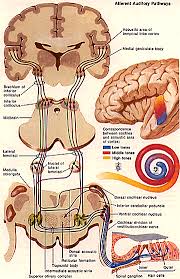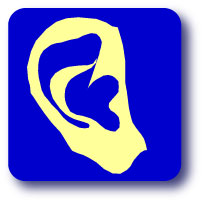via Amyloidosis
Hearing Loss, Job Performance and Income
Many people are aware that their hearing has deteriorated but they are hesitant to do anything about it. There are various reasons that they don’t  seek help. Unfortunately, many people wait years or even decades, to get their hearing checked. During those years of putting it off and ignoring their problem, auditory deprivation can start to raise its ugly head. With auditory deprivation, the individual’s ability to understand amplified speech deteriorates because of inadequate auditory stimulation. Also, a study done last year at Johns Hopkins revealed a strong link between hearing loss and dementia. People should not ignore the early signs of hearing loss.
seek help. Unfortunately, many people wait years or even decades, to get their hearing checked. During those years of putting it off and ignoring their problem, auditory deprivation can start to raise its ugly head. With auditory deprivation, the individual’s ability to understand amplified speech deteriorates because of inadequate auditory stimulation. Also, a study done last year at Johns Hopkins revealed a strong link between hearing loss and dementia. People should not ignore the early signs of hearing loss.
Hearing Loss Leads to Brain Tissue Loss in Older Adults
Hearing loss isn’t just an inconvenience—it could be harmful for your brain, too.
A new study from Johns Hopkins University and the National Institute on Aging shows that people with hearing loss have accelerated brain tissue loss. This is in addition to a higher risk of poor physical and mental health, dementia, falls, and hospitalizations.
Frank Lin, Ph.D., an assistant professor at Johns Hopkins, evaluated data from the ongoing Baltimore Longitudinal Study of Aging to compare brain alterations that occurred over time in adults with normal hearing and those with an impaired sense. His research was published in Neuroimage.
According to the American Speech-Language-Hearing Association, more than 30 percent of people over the age of 65 have some type of hearing loss, and 14 percent of people between 45 and 64 do as well. Close to 8 million people between the ages of 18 and 44 have hearing loss.
How Does Hearing Loss Change the Brain?
Studies in the past have linked hearing loss to structural differences in human and animal brains. They’ve found that brains are sometimes smaller in people and animals with poor hearing.
In the Baltimore Longitudinal Study of Aging, 126 participants had yearly magnetic resonance imaging (MRI) to track brain changes for up to a decade. They also had physical exams and hearing tests.
When the study period began in 1994, 75 participants had normal hearing, and 51 had impaired hearing that included at least a 25-decibel loss. Lin found that people with hearing loss at the start of the study had quicker rates of brain atrophy than those with normal hearing.
The scientists say that people with diminished hearing lost more than an additional cubic centimeter of brain tissue each year compared to those with normal hearing. People with hearing loss also experienced more shrinkage in the superior, middle, and inferior temporal gyri—parts of the brain that process sound and speech.
Lin wasn’t surprised by that; in fact, he said it may be a result of an “impoverished” auditory cortex, which could shrink due to lack of stimulation. But those parts don’t work alone; they also play roles in memory and sensory integration. And they have been shown to be linked with the early phases of dementia and Alzheimer’s disease.
“Our results suggest that hearing loss could be another ‘hit’ on the brain in many ways,” Lin said. He urges people not to ignore possible hearing loss. If hearing loss is contributing to the differences the scientists saw on the MRI scans, it should be treated before structural brain changes occur.
Eric Smouha, M.D., an associate professor of otolaryngology at the Icahn School of Medicine at Mount Sinai in New York City, said that the new study offers more evidence that hearing loss contributes to dementia.
Time for a Hearing Test?
The American Speech-Language-Hearing Association recommends that adults be screened for hearing loss at least every decade through age 50 and at three-year intervals thereafter. A hearing test takes about 30 minutes and measures hearing sensitivity to pure tones and speech.
A first visit to an audiologist will include questions about your medical history and an ear exam with an instrument called an otoscope. The doctor will then put you through various tests that involve listening and signaling when the audiologist says to.
If you suspect hearing loss, Smouha says, you should go for audiometric testing right away and get a hearing aid if significant loss is detected. “The study makes a good case for the concept of disuse atrophy…use it or lose it,” Smouha said.
Eric W. Healy, Ph.D., a professor of speech and hearing at Ohio State University, thinks it’s a good idea to have a screening if you think you might have some hearing loss—even the tiniest bit. “It’s not uncommon to believe that you have a ‘problem’ with your hearing,” Healy said. “It’s simple to test, and many people who believe that they have an issue actually don’t.” If you are routinely exposed to loud noises or music, go in for a hearing screening, he said. “A test done early can serve as a baseline for future comparison,” Healy said. “There’s little reason not to.”
#hearingloss, #dementia
Business Webpage: www.hearingaidsinfortwayne.com
Facebook: www.facebook.com/fortwaynehearing
Twitter: https://twitter.com/hearwellhere
Linkedin: http://www.linkedin.com/company/dr-gregory-lowe-audiologist?trk=company_name
Youtube: www.youtube.com/user/uhearhere
Google+: https://plus.google.com/+Hearingaidsinfortwayne/posts
Ear Candling, Should it Really Be Done?
About every six months or so, someone comes into my office and asks me what I  think of ear candling. Most of you know that an ear occluded with earwax (cerumen) can cause #hearingloss by impeding sound. From everything I have learned over the years, I usually tell these individuals that it can be dangerous, it does not work, and I don’t recommend it. In response, some of these people say, “But you should see all the yuck that came out of the ear!” Well, the yuck is usually just wax from the candle. If you still think this procedure is safe and effective, please click on the link below before you let someone candle you ear again:
think of ear candling. Most of you know that an ear occluded with earwax (cerumen) can cause #hearingloss by impeding sound. From everything I have learned over the years, I usually tell these individuals that it can be dangerous, it does not work, and I don’t recommend it. In response, some of these people say, “But you should see all the yuck that came out of the ear!” Well, the yuck is usually just wax from the candle. If you still think this procedure is safe and effective, please click on the link below before you let someone candle you ear again:
http://www.audiology.org/news/Pages/20100622.aspx
Business Webpage: www.hearingaidsinfortwayne.com
Facebook: www.facebook.com/fortwaynehearing
Twitter: https://twitter.com/hearwellhere
Linkedin: http://www.linkedin.com/company/dr-gregory-lowe-audiologist?trk=company_name
Youtube: www.youtube.com/user/uhearhere
Google+: https://plus.google.com/+Hearingaidsinfortwayne/posts
Aspirin to Treat Acoustic Tumors?
Audiologists are always concerned with patients who present a unilateral sensorineural hearing loss with poor speech recognition and tinnitus. We were trained in graduate school to always be suspicious of a possible acoustic neuroma on the auditory nerve. I can remember several of my past audiology professors  trying to drill this into our heads. A unilateral loss should always be taken seriously and reported to the patient’s primary care physician. Patients with acoustic neuroma also often experience dizziness since the auditory and vestibular nerves run side by side as they exit the inner ear. A tumor on the auditory nerve may also push or cause pressure the vestibular leading to the dizziness. If caught early, acoustic neuromas are usually not life threatening. Sometimes hearing can be preserved if the tumor has not grown deeply into the auditory nerve.
trying to drill this into our heads. A unilateral loss should always be taken seriously and reported to the patient’s primary care physician. Patients with acoustic neuroma also often experience dizziness since the auditory and vestibular nerves run side by side as they exit the inner ear. A tumor on the auditory nerve may also push or cause pressure the vestibular leading to the dizziness. If caught early, acoustic neuromas are usually not life threatening. Sometimes hearing can be preserved if the tumor has not grown deeply into the auditory nerve.
Below in a study indicating that aspirin may possibly help reduce the size of the tumor. That’s interesting, because we have also been trained that aspirin can cause tinnitus and if taken in large quantities can cause damage to the hair cells in the cochlea resulting in sensorineural hearing loss. More studies hopefully will tell us how much aspirin is safe if used for treating #acoustic neuromas.
http://www.hearingreview.com/all-news/22230-aspirin-intake-may-halt-growth-of-acoustic-neuromas
Business Webpage: www.hearingaidsinfortwayne.com
Facebook: www.facebook.com/fortwaynehearing
Twitter: https://twitter.com/hearwellhere
Linkedin: http://www.linkedin.com/company/dr-gregory-lowe-audiologist?trk=company_name
Youtube: www.youtube.com/user/uhearhere
Google+: https://plus.google.com/+Hearingaidsinfortwayne/posts
More on Auditory Deprivation
Audiologists and otologists have known for several years that if hearing loss goes  untreated for too long, a phenomenon called auditory deprivation occurs. Auditory deprivation is a decrease in a person’s ability to understand speech clearly because of a lack of adequate auditory stimulation.
untreated for too long, a phenomenon called auditory deprivation occurs. Auditory deprivation is a decrease in a person’s ability to understand speech clearly because of a lack of adequate auditory stimulation.
Most audiologists check their patient’s word recognition during the initial comprehensive hearing evaluation. The word recognition test assesses the patient’s ability to repeat words presented to them at a comfortable listening level which is usually at a level high enough to compensate for their hearing impairment. When a patient scores very low on the word recognition test, it is often because of auditory deprivation. The reversibility of auditory deprivation has been a source of dispute among researchers. However, we know that hearing aids have helped in preserving word clarity.
The first study to document auditory deprivation was in 1984 by Silman and Silverman of City University of New York. The study followed hearing impaired adults who had an equal amount of hearing loss in both ears, but only wore one hearing aid. The study found that the patients’ hearing thresholds for pure tones decreased the same amount in each ear over time, but that the ability to understand words decreased significantly in only the ear without the hearing aid. This study suggests that both ears be fit with hearing aids as soon as possible after a hearing loss is diagnosed to prevent auditory deprivation. Since that time, numerous investigations and studies worldwide have supported the initial findings.
 The good news is that when identified early and treated quickly, individuals with hearing loss have better success with hearing devices and preserve their having ability to understand speech for the remainder of their lifespan. The longer a person delays seeking help, the greater their chances of having poor speech recognition. It is very sad when someone comes into the office too late. Their word recognition scores are very low and then they are very disappointed that speech is not clear even with new hearing aids.
The good news is that when identified early and treated quickly, individuals with hearing loss have better success with hearing devices and preserve their having ability to understand speech for the remainder of their lifespan. The longer a person delays seeking help, the greater their chances of having poor speech recognition. It is very sad when someone comes into the office too late. Their word recognition scores are very low and then they are very disappointed that speech is not clear even with new hearing aids.
Business Webpage: www.hearingaidsinfortwayne.com
Facebook: www.facebook.com/fortwaynehearing
Twitter: https://twitter.com/hearwellhere
Linkedin: http://www.linkedin.com/company/dr-gregory-lowe-audiologist?trk=hb_tab_compy_id_2983014
Youtube: www.youtube.com/user/uhearhere
Google+: https://plus.google.com/+Hearingaidsinfortwayne/posts
Friedrich Nietzsche Quote
Quote
“We hear only those questions for which we are in a position to find answers.”
Business Webpage: www.hearingaidsinfortwayne.com
Facebook: www.facebook.com/fortwaynehearing
Twitter: https://twitter.com/hearwellhere
Linkedin: http://www.linkedin.com/company/dr-gregory-lowe-audiologist?trk=hb_tab_compy_id_2983014
Youtube: www.youtube.com/user/uhearhere
Google+: https://plus.google.com/+Hearingaidsinfortwayne/posts
Induction Loop Systems for Hearing Impaired
This is a good article in induction loop systems if you have no idea what they are.  Induction loop systems can be a great help for someone wearing hearing aids. It almost like putting the speaker’s voice directly into your ear canal thereby increasing the signal to noise ratio dramatically. Click on link below.
Induction loop systems can be a great help for someone wearing hearing aids. It almost like putting the speaker’s voice directly into your ear canal thereby increasing the signal to noise ratio dramatically. Click on link below.
http://www.medel.com/blog/what-is-an-induction-loop/
Business Webpage: www.hearingaidsinfortwayne.com
Facebook: www.facebook.com/fortwaynehearing
Twitter: https://twitter.com/hearwellhere
Linkedin: http://www.linkedin.com/company/dr-gregory-lowe-audiologist?trk=hb_tab_compy_id_2983014
Youtube: www.youtube.com/user/uhearhere
Google+: https://plus.google.com/+Hearingaidsinfortwayne/posts
Improve Your Hearing and Improve Quality of Life!
According to the Better Hearing Institute, research shows that hearing loss is frequently associated with other physical, mental, and emotional health conditions, and that people who address their hearing loss often experience better quality of life. Eight out of 10 hearing aid users, in fact, say they’re satisfied with the changes that have occurred in their lives specifically due to their hearing aids such as from how they feel about themselves to the positive changes they see in their relationships, social interactions, and work lives.
who address their hearing loss often experience better quality of life. Eight out of 10 hearing aid users, in fact, say they’re satisfied with the changes that have occurred in their lives specifically due to their hearing aids such as from how they feel about themselves to the positive changes they see in their relationships, social interactions, and work lives.
 When people with even mild hearing loss use hearing aids, they often improve their job performance; enhance their communication skills; increase their earnings potential; improve their professional and interpersonal relationships; stave off depression; gain an enhanced sense of control over their lives; and better their quality of life.
When people with even mild hearing loss use hearing aids, they often improve their job performance; enhance their communication skills; increase their earnings potential; improve their professional and interpersonal relationships; stave off depression; gain an enhanced sense of control over their lives; and better their quality of life.
Here are five little-known facts about today’s hearing aids:
- They’re virtually invisible. Many of today’s hearing aids sit discreetly and comfortably inside the ear canal, providing both natural sound quality, and discreet and easy use.
- They automatically adjust to all kinds of soundscapes. Recent technological advances with directional microphones have made hearing aids far more versatile than ever before—and in a broad range of sound environments.
- You can enjoy water sports and sweat while wearing them. Waterproof digital hearing aids have arrived. This feature is built into some newly designed hearing aids for those concerned about water, humidity, and dust. This feature suits the active lifestyles of swimmers, skiers, snowboarders, intensive sports enthusiasts and anyone working in dusty, demanding environments.
- They work with smartphones, home entertainment systems and other electronics. Wireless, digital hearing aids are now the norm. That means seamless connectivity—directly into your hearing aid(s) at volumes that are just right for you—from your smartphone, MP3 player, television and other high-tech gadgets.
- They’re always at the ready. A new rechargeable feature on some newly designed hearing aids allows you to recharge your hearing aids every night, so they’re ready in the morning. It’s super convenient —and there’s no more fumbling with small batteries.
Business Webpage: www.hearingaidsinfortwayne.com
Facebook: www.facebook.com/fortwaynehearing
Twitter: https://twitter.com/hearwellhere
Linkedin: http://www.linkedin.com/company/dr-gregory-lowe-audiologist?trk=hb_tab_compy_id_2983014
Youtube: www.youtube.com/user/uhearhere
Google+: https://plus.google.com/+Hearingaidsinfortwayne/posts
Our Products and Services
For information regarding our products and services, please click on the Facebook link below and “Like” our page:



